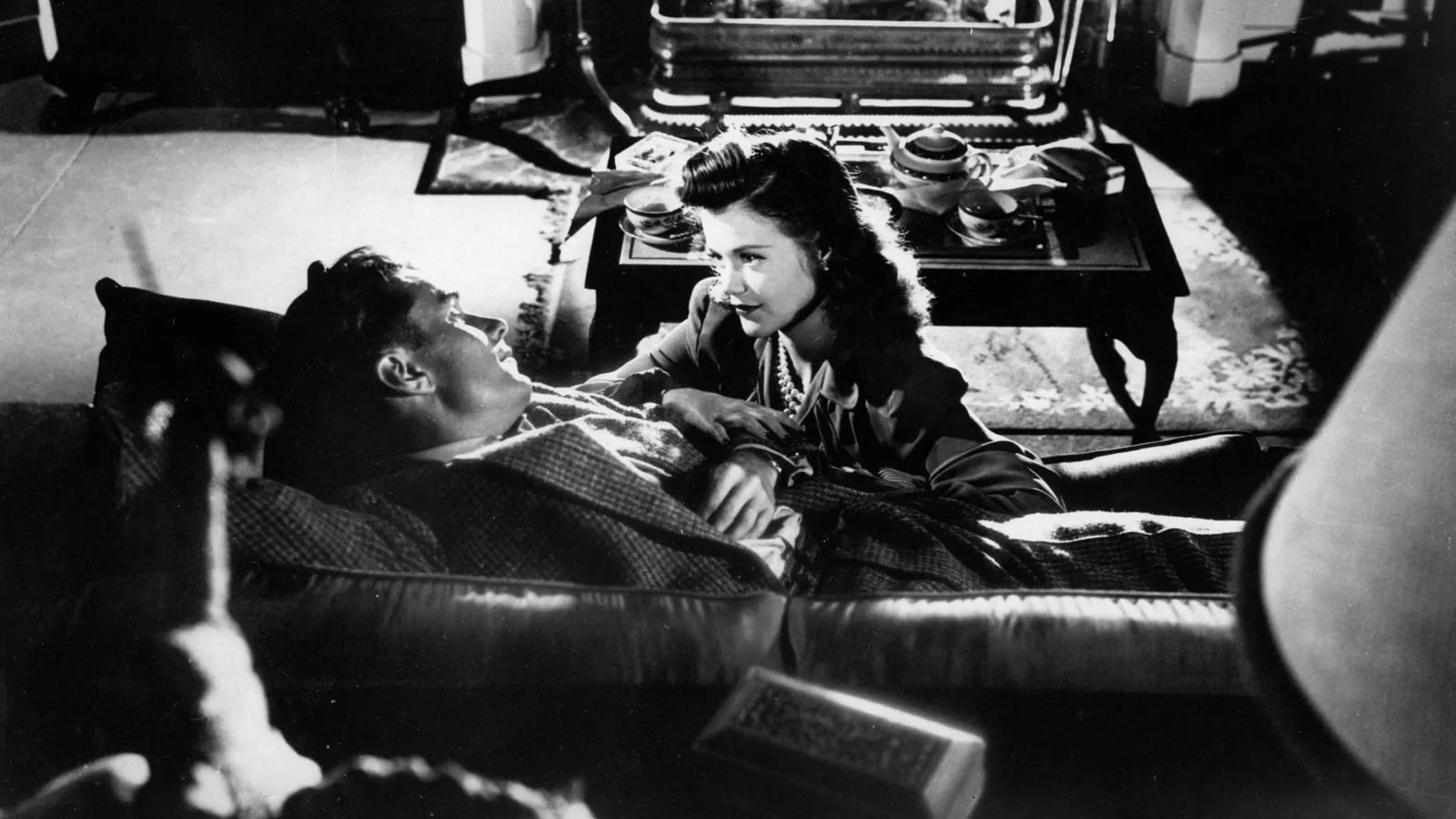
Why Hollywood is shunning sex
Fred MacMurray obsesses over the way an anklet digs into Barbara Stanwyck's leg in Double Indemnity. Viggo Mortensen and Maria Bello melt from a marital fight into lustful, aggressive sex on a staircase in A History of Violence. Kim Basinger and Mickey Rourke engage in a kitchen-floor dalliance in 9½ Weeks.
Just three examples of red-hot desire on the big screen, out of the many throughout the whole of cinema history. Whether sexy exchanged glances or heavy petting, carefully framed in the sheets or full-frontal nudity, sexuality is an inherent part of the cinematic experience – because sex is an inherent part of our lives. To deny sex and sexuality in the cinema is to deny our own fully-fledged humanity. But are filmmakers increasingly shunning the erotic nonetheless?
 Paul Verhoeven's latest film Benedetta is typically sex-filled, but the
filmmaker believes Hollywood is becoming more puritanical
Paul Verhoeven's latest film Benedetta is typically sex-filled, but the
filmmaker believes Hollywood is becoming more puritanical
This summer, ahead of his movie Benedetta premiering at the Cannes Film Festival, veteran filmmaker Paul Verhoeven did an interview with Variety. Asked why films like his 1992 erotic thriller Basic Instinct weren't being made in Hollywood anymore, he said, "There's been a general shift towards Puritanism. I think there's a misunderstanding about sexuality in the United States. Sexuality is the most essential element of nature. I'm always amazed people are shocked by sex in movies."
For some film critics, who have been lamenting what they perceive to be Hollywood's new Puritanism for some time, hearing this from Verhoeven seemed to feel like vindication. After all, Verhoeven helped define the 90s erotic thriller, and has been a filmmaker interested in outré sexuality from the word go. Although he began making movies in his native Netherlands in the late 1970s, his move to the Hollywood mainstream maintained the same taste-and boundary-pushing flavour, from Basic Instinct's notorious interrogation scene to the vulgarity of the maligned Showgirls (1995), all the way up to his recent drama about sexual consent, Elle (2017). Verhoeven clearly hasn't lost his transgressive touch, either: at this year's New York Film Festival, a Catholic group came to protest his depiction of 17th-Century lesbian nuns in Benedetta. Suffice to say, the man knows something about depicting sex in the movies.
What the statistics show
So is Verhoeven right? Is Hollywood really taking a turn toward sexlessness? According to research done in 2019 by writer Kate Hagen, the answer is: yes. Using data from IMDB, she found that statistically, there are fewer sex scenes in mainstream motion pictures currently than there have been at any point in the past 50 years. As Hagen writes: "Only 1.21% of the 148,012 feature-length films released since 2010 [according to the IMDB database] contain depictions of sex. That percentage is the lowest [of any decade] since the 1960s. Sex in cinema peaked in the 1990s, the heyday of the erotic thriller, with 1.79% of all films featuring sex scenes. That half-point decline is massive in relative terms, considering almost four times as many films have been released in the 2010s as in the 1990s."
To be sure, there will always be movies like the recent madcap musical Annette, the first film in English by French auteur Leos Carax, in which his stars Adam Driver and Marion Cotillard sing while performing oral sex. Or Titane, this year's Palme d'Or winner, whose gender-fluid sexual hijinks have made it an arthouse sensation. But that's arguably the crux of the problem: while depictions of sex may be flourishing within European-minded art cinema, the mainstream US and British film industries have become less sexually-charged. What happened to softcore, to porno-chic, to erotic thrillers? Even outside of any of those specifically "sexy" genres, what happened to romantic comedies and coming-of-age tales and propulsive action movies that had – even just a sprinkle of – genuine sexual frisson?
We are comparing films to programmes made for streaming services, and maybe finding them a bit tame – Helen Lewis
There are several trends, social and cinematic, that might be held responsible for this shift away from sex on our big screens. The most-cited reason is that since the height of the erotic thriller in the 1990s, online pornography became so widely available that audiences were getting their kicks elsewhere, so to speak. For his part, though, Paul Verhoeven disagrees with this reading, telling Variety, "There was pornography all over the place when I was young, if you wanted it. If there is a change in how we view sexuality in films, I don't think it has to do with porn on the internet."
Writer and cultural commentator Helen Lewis, author of Difficult Women: A History of Feminism in 11 Fights, thinks the flourishing of TV as an art form known for its sexual frankness has had an effect on the way audiences view sex on the big screen. "We are comparing films to programmes made for streaming services, and maybe finding them a bit tame. In television, HBO was the pioneer of a model that said: you bought a subscription, so we will assume you're an adult. That allowed it to show programmes like, say, Sex and The City and The Deuce," she says.
Netflix, too, seems keen to wade into this sexed-up territory, treading where movie studios daren't. One of their biggest ever hits has been period romance Bridgerton, whose mass audience appeal seems not to have been solely located in its frivolous romantic larks, but in its tantalising, several-episode build-up to its steamy sex scenes. They've followed suit with the low-production value but incredibly successful softcore series Sex/Life, focused on a married woman's sexual fantasies.
 Marvel superheroes such as Thor are typically hyper-buff but asexual
Marvel superheroes such as Thor are typically hyper-buff but asexual
What's been happening on the small screen aside, though, many have suggested that a real spirit of asexuality has infused much Hollywood product. In her piece Everyone is Beautiful and No One is Horny, writer Raquel S Benedict offers a particular theory about why this is, to do with the muscle-bound and gym-perfected Hollywood bodies we see in the superhero and action films, particularly those in the Marvel and DC universes, that now dominate the multiplexes. Scathing of this shift, she writes that these hyper-sculpted characters embody a new piousness, physical, sexual and otherwise, their implicit message being that "to have fun is to become weak, to let your team down and to give the enemy a chance to win, like Thor did when he got fat in [Avengers] Endgame". (Compare and contrast the Thors and Batmans of today with the oiled-up sexuality of a young Sylvester Stallone or Jean-Claude Van Damme, for example, who were ultra-buff but enjoyed themselves with it, winking at female and gay male viewers in overtly saucy scenes.
How expectations have changed
Benedict points out that this desexualised aesthetic has gone hand in hand with a sea change around how much sex audiences actually expect in mainstream cinema. When we look at the 80s and 90s, she argues, even the films from that era we may recall as family-friendly have more sex in them, either literal or inferred, than the majority of today's big-screen output. "Millennial and Gen Z viewers are often startled to encounter long-forgotten sexual content: John Connor's conception in Terminator, Jamie Lee Curtis's toplessness in Trading Places, the spectral blowjob in Ghostbusters," she writes. "These scenes didn't shock us when we first saw them. [We thought:] of course there's sex in a movie. Isn't there always?"
Sex is messy and risky, and there is arguably nothing today's entertainment conglomerates want less than to risk alienating consumers
As large and family-friendly corporations like Disney become increasingly dominant within the cultural landscape, the answer seems to be: no. UK Cinema Association chief executive Phil Clapp recently told the i Newspaper that the number of 18 and 15-rated films had dropped over the past decade with studios "increasingly targeting family audiences to maximise box office returns".
What's more, when blockbuster films are designed to be formulaic and inoffensive enough to appeal to a large audience, they tend to become pared down to action, plot, exposition, and violent CGI set pieces. In other words: efficiency. Violent action scenes can more obviously move the plot forward. But sex is not efficient. It's not – strictly speaking – necessary. It's messy, and risky, and there is arguably nothing today's entertainment conglomerates want less than to risk alienating consumers. "Here, perhaps, there is a kind of self-censorship that doesn’t allow the writers to write other kinds of stories," arthouse master Pedro Almodóvar has said of the current supremacy of the superhero film. "There are many, many movies about superheroes. And sexuality doesn’t exist for superheroes. They are neutered." Admittedly, the latest Marvel film Eternals, released this week, does finally feature the franchise's first sex scene – though, given its apparent brevity and the undue fuss that has been made about it, one wonders if this is little more than a box-ticking exercise to silence previous criticism about the MCU's sexlessness.
Yet for all such complaints, there is, conversely, an increasing swell of sentiment out there that there is, in fact, too much sex on our screens. In spite of proven data that there are fewer sex scenes in cinema than in previous decades, the argument that sex scenes, wholesale, are "unnecessary", and should therefore be dispensed with, has become increasingly prevalent on Twitter and other online forums. "It's fascinating and exhausting watching the persistent discourse around sex scenes," says Hagen. "I just cannot fathom what people are possibly watching that has 'too much sex' in 2021." The logical conclusion is simply that some viewers (many of them skewing younger) are disinclined to watch sex scenes, even the relatively few that are cropping up these days. This lack of interest in (or, judging by social media in some cases, active distaste for) sexual content may well have captured the attention of studio decision-makers.
While the majority of sex scenes are still very heteronormative, there's been a noticeble increase in sex acts that privilege female sexual pleasure – Frances Rayner
This new discomfort with depictions of sex is also likely connected to the revelations of the #MeToo movement. The reckoning with assault and abuse in the film industry has ushered in enormous positive change, encouraged filmmakers to nix female objectification, and led to the increasing introduction of intimacy coordinators to help actors feel safe. Their efforts ensure issues of boundaries and consent are correctly navigated while filming sex scenes. But even then, anxieties may remain about the validity of depicting sex, and whether it is gratuitous or not. Lately, sex has felt like a very serious topic; one that no one wants to joke about or "get wrong". Filmmakers may be responding to this anxiety with their own shyness around the topic: no one wants a social media storm on their hands.
In a 2019 piece, Washington Post film critic Ann Hornaday made a salient point about the need for some balance when it comes to the film industry's approach to sex on screen. "To be sure, there's precious little to mourn in the death of the kind of ogling soft-core wish-fulfillment fantasies that male directors foisted on viewers for nearly a century. But is abstinence really our only option?" she wrote. "With young filmmakers being co-opted by the Disney-Marvel complex, and with millennials and Generation Z reportedly having less sex than their predecessors, the new chastity on screen feels like a prudent but not entirely welcome new normal."
 Cinema has always been sexually suggestive, even when it couldn't show sex, as with classic 1940s horror Cat People
Cinema has always been sexually suggestive, even when it couldn't show sex, as with classic 1940s horror Cat People
As Helen Lewis points out, though, TV seems to have figured out what cinema still needs to: how to handle a hot potato. "On the BBC, I May Destroy You recently showed graphic sex scenes – but they weren’t titillating in the old-fashioned meaning of 'explicit', they were challenging, uncomfortable, and unflinching," she says. "I think cinema is beginning to face that conversation: 'What's this sex scene doing here? Who is it for?'"
That questioning has undeniably led to positive changes around representation of female desire on the screen, too. Frances Rayner, the founder of website The Clit Test, which examines film and television through the lens of whether its sex depicts female pleasure and sexuality honestly, says, "While the majority of sex scenes are still very heteronormative, there's been a noticeble increase in sex acts that privilege female sexual pleasure, like cunnilingus. And we've seen an uptick in scenes of women masturbating – something which was previously notable for its absence."
Is film losing sensuality too?
But for depictions of sex to be progressive, they have to be included in the first place. In general, is it the case that in little over a century of American cinema, movies really might have inched closer to Puritanism, even as wider society has on the whole become more sexually open? Hagen's study of sex scenes evidentially suggests this, though it's worth remembering that its stats only apply to literal onscreen depictions of sex, not for the tiny moments of raw sensuality that cannot be scaled on any real metric. Cinematically speaking, the carnal can be just as much about allusion and suggestion; a bite into a lush summer peach or the sinewy slide of a satin dress onto a carpeted floor.
Suggestion is built into cinema at a molecular level; it's one of the principles behind the entire concept of editing. Our minds make lateral jumps from one image to the next, adding their implications together so quickly that it's hardly conscious. And when it comes to sexual suggestions, US cinema has always had to be a little bit sneaky. Censorship in Hollywood reigned supreme from 1932, at the instatement of the Hays Production Code, to its eventual slow dissolve in the late 1950s. Much of the code focused on banning pre-marital relations and refusing to show even married couples in bed together, never mind revealing a visibly pregnant woman, an interracial relationship, or the implication of homosexuality.
None of this meant that clever filmmakers could not try to flout the code with a million and one innuendos and sideways looks. Sometimes the sexual was made deliciously metaphorical, as with Jacques Tourneur's classic horror Cat People (1942), where uncontrolled female sexuality is literally predatory. But genuine nudity, or the "sex scene" as we know it, simply did not exist in mainstream American film until the early 60s. So much of Hollywood's history of sex was smuggled, implied, or gestural; so little of it was explicit, until the sexual revolution of the 60s and 70s.
Not only is sex shut out now, but the kind of sizzling star chemistry that has long been one of the medium's great delights
History has shown us we don't need explicit sex scenes to infer sexual frisson. As master Hollywood filmmaker Ernst Lubitsch (director of Design for Living, Ninotchka and a host of other audacious 30s and 40s screwball classics) once said, "Treat your audience with respect... let them add up two plus two… they'll love you forever."
However, the worry is that, as well as there being less explicit depictions of sex in the movies now, there has also been a more general loss of sensuality – which again can be seen to have an economic basis. As Stephen Galloway, a writer for The Hollywood Reporter, has said: "Hollywood is simply no longer in the business of making mid-budget character dramas that might or might not include physical bonding." Too often, with the decline of both romantic dramas and romantic comedies as film genres, that seems not only to mean sex is shut out, but the kind of sizzling star chemistry that has long been one of the medium's great delights.
Hollywood cinema is at a crossroads. Armed with knowledge of past mistakes, of sexism and homophobia, the best hope is that artists can respond to depicting sex and sexuality with more awareness and sensitivity than before. And while some may be asking if the sex scene is unnecessary, some must also reply: aren't most good things?










